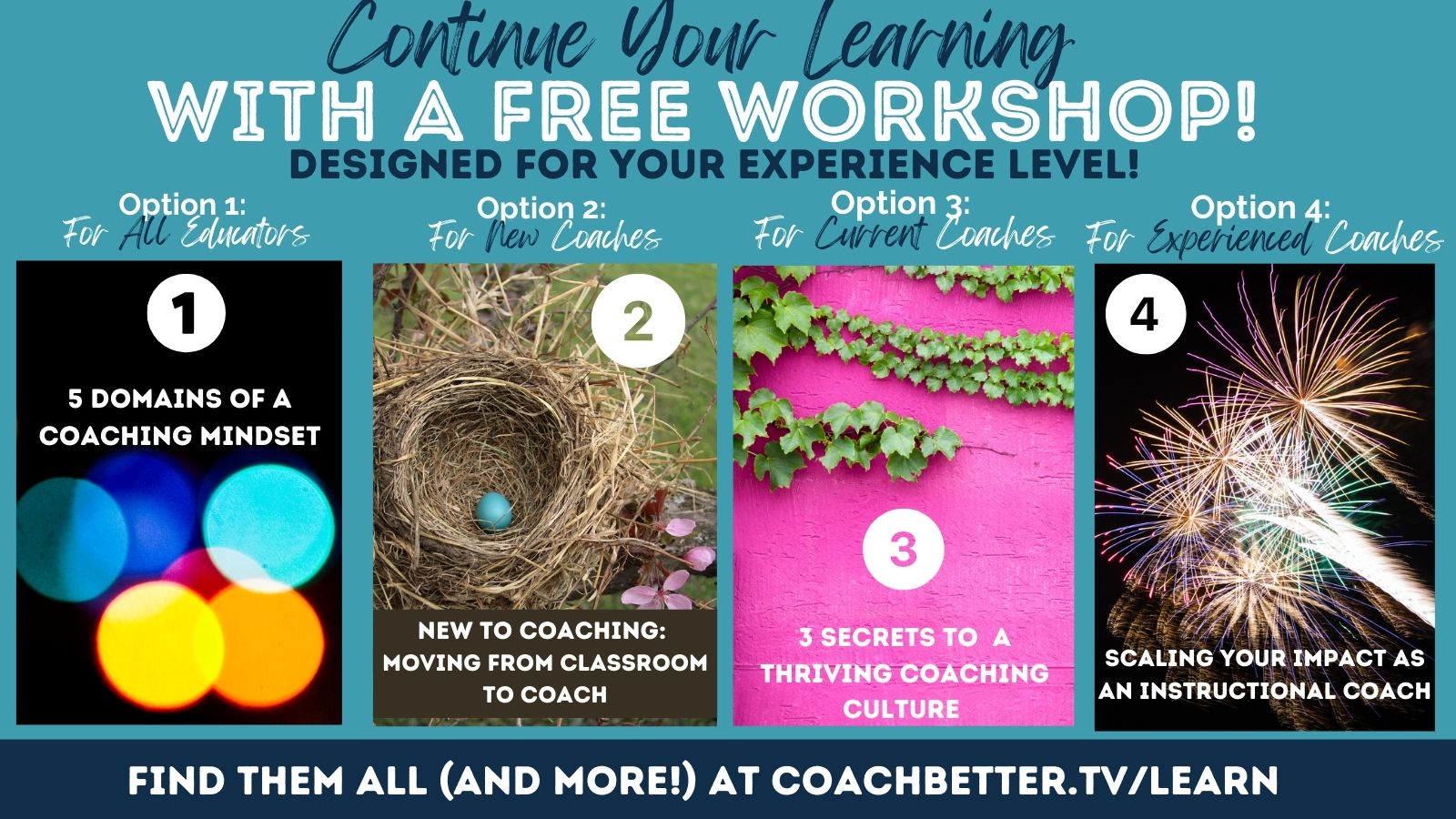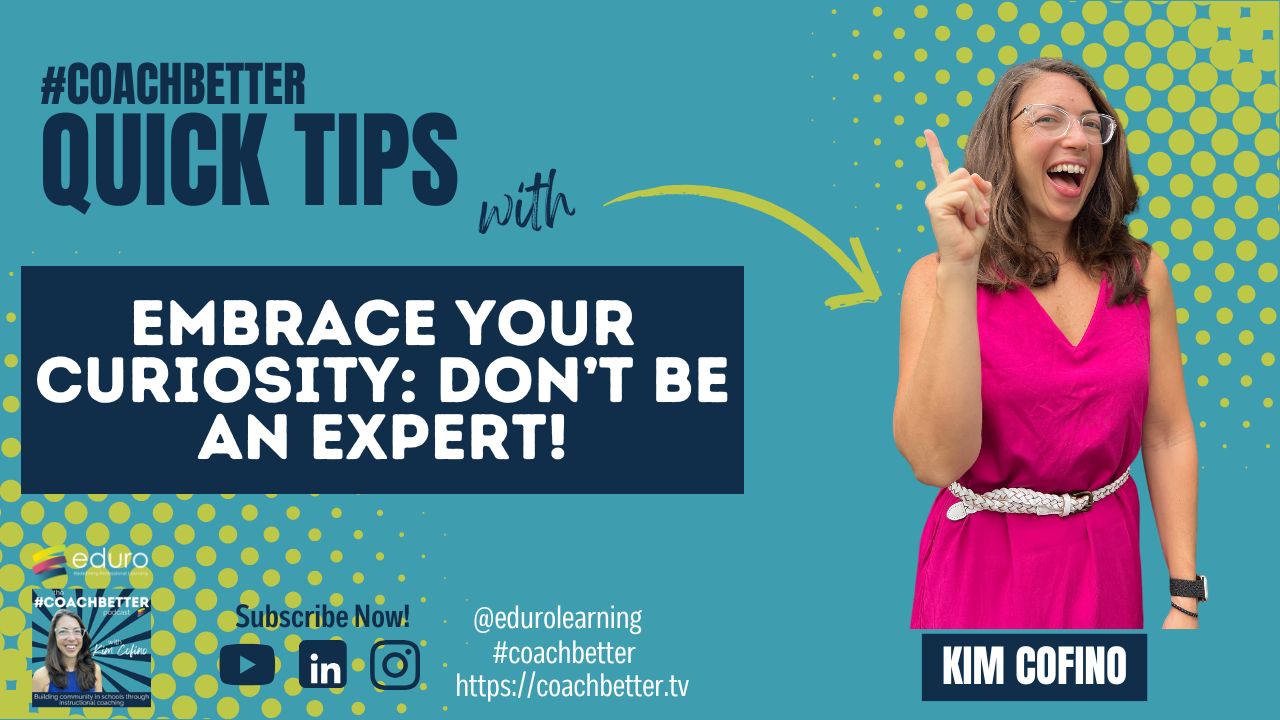Over the years, in the courses I teach, consulting with schools, and workshops I’ve offered, I’ve worked with so many educators who are learning to become coaches. There’s one issue that emerges time and time again.
It’s easier to be an expert (or a consultant) than it is to coach.
Whether it’s building peer coaching skills among a full faculty, or inside The Coach with educators who are learning to be instructional coaches, or in workshops with teachers who are just learning about coaching, we all feel very comfortable in the consultancy dynamic. We’re familiar with the concept of mentoring or giving advice, and it’s easy to think that coaching is the same thing.
We might expect coaching to look like:
The teacher has a question, and looks to the “coach” for the solution.
This is a space where both parties feel good: the teacher gets the answer and the coach provides the solution.
The problem with this, as Laura Lipton said in an previous #coachbetter episode: our job as coaches is to build independence. Being an expert, and offering advice, only builds dependence.
In fact, you might consider offering advice or solutions too early as “stealing your coaching partner’s opportunity for growth”.
So, my advice is: if you are working toward coaching, don’t be an expert.
Yes, it’s faster to just problem-solve whatever is happening in the classroom, but in this episode we’re going to chat about why this is actually working against you – and your coaching culture – and not helping your coaching partners either!
What’s YOUR level of coaching mastery?
All coaches go through various stages of coaching mastery. Once you identify where you’re at, you can begin to build the skills needed to move to the next stage.
This quiz is based on real-life case studies compiled from years of working with coaches inside The Coach Certificate & Mentorship Program!
When you receive your results, you’ll also get your matching case study from the STRIVE Case Studies to see where you fit in the stages of coaching mastery.
Ready to tackle your challenges and move on to the next level in YOUR coaching practice?

The STRIVE Model of Coaching Mastery quiz will help you identify your level of coaching mastery by matching you with case studies compiled from years of working with coaches inside The Coach Certificate & Mentorship Program so you can easily see where you fit!
When you complete the quiz, you’ll get:
- Your matching case study,
- Specific strengths & challenges aligned to your result;
- Suggested next steps for each stage;
Plus the Case Study Document includes:
- Case studies leveled by coaching mastery;
- A framework to identify essential stages of professional growth & key areas to focus on in your professional learning;
- Alignment with the THRIVE Model for a Successful Coaching Culture;
- Space for you to reflect & prioritize so you can take action immediately!
You’ll go straight to the Quiz, and get the Case Studies by email.
Being an Expert Gets in the Way of Being a Coach!
As coaches, we often step into the role because we are especially good at something in our own classrooms. We’re great at literacy, at working with multilingual learners, at technology, at math, at student engagement. Whatever it is, we’ve been noticed for the great work we’re doing in our classrooms.
This is a wonderful way to open the door to classroom visits, modeling and sharing expertise.
However, being an expert can really get in the way of being a coach.
When you see yourself as a subject-area expert (rather than a coach), you often:
- immediately “diagnose” the problem (like a doctor) without spending enough time listening to what the teacher is actually saying (When we think we know, we tend to listen less)
- reinforce the expert / learner dynamic, rather than build capacity within your coaching partner
- build a culture of reactionary “coaching” which is really problem solving, rather than helping teachers recognize that coaching is an ongoing process, which begins at the beginning of a unit (not when a problem arises) – check out the previous episode about moving from reactive to proactive coaching for more about this.
The extra challenging part about this is that our coaching partners also often want an expert to solve their problems too. This often happens when our coaching partners have a misconception about coaching vs consulting.
Consulting or mentoring is when an expert is passing on guidance & knowledge.
Coaching is when a peer is providing thought partnership combined with objective data for reflection.
We talked about exactly this difference when I was working with a school on developing a coaching mindset across the entire faculty. One of the challenges we discussed is that when a peer coach is not an expert in the teacher’s subject area, they don’t understand some of the vocabulary the teacher may use.
This is not necessarily a bad thing. It’s completely unrealistic to think that schools would be able to have an expert in every subject area as a coach, it’s simply not sustainable.
Instead, we need to think about coaching as a way to build capacity – not dependence.
To add to this challenge, coaches often feel pressure to be an expert in their coaching partner’s subject area. This is really not a realistic expectation – schools do not have the financial capacity to hire an expert teacher in every subject area at every grade level to be a coach. They hire a coach to help the expert teachers process their thinking & reflect on objective data with a non-evaluative thought partner.
Coaches can also leverage the power of a coaching mindset to work with the subject area experts within the school community like the HODs to get that subject area expertise alongside their expertise as a coach
So, if you’ve been stuck thinking that you need to be an expert in everything to be a good coach, I would like to invite you to reframe this perspective.
Think about your lack of subject-area expertise as an asset to your coaching – not a deficit.
Remember, your coaching partner is the expert in:
- their subject area
- their students
- their grade level / age range
When you enter into a coaching conversation with this mindset you
- must respect the expertise of your coaching partner (because you don’t know all those things that they are the expert in), which allows you to..
- listen with genuine curiosity.
- stop trying to be an immediate problem solver, so you have to work to build your coaching partner’s capacity, and you
- be intentional about slowing down, paraphrasing and pausing during the conversation so you truly understand what your coaching partner needs (since you can’t make assumptions).
Instead of trying to be the expert in everything, be the expert in the process of coaching.
The skills of being a coach are much more complex than it may first appear. Learning how to navigate coaching stances (we have an episode on that), how to ask just the right questions (and an episode on that), and to be invitational throughout the process is the skill of coaching.
That’s what supports our coaching partners to build their own capacity.
So, if there’s one thing you can do to build your coaching skills it’s don’t be a consultant. Your expertise is getting in the way of your coaching.
Watch the Video
Develop a Coaching Mindset!
The key is to develop a coaching mindset – where we let empathetic listening and curiosity be the lens through which we structure our conversations.
If this is something you are building in your coaching practice, come join us in one of our courses for coaches!
We include intentional time to reflect on your current coaching capacity, so you can build the next set of your coaching skills – at the level that’s right for your experience.
Each of our global cohorts will help you take the next step in your coaching practice:
- as an educator or leader ready to learn about a coaching mindset in Cultivating a Coaching mindset, or
- a brand new or aspiring coach in Getting Started as an Instructional Coach, or
- a current coach or educator ready to build a thriving coaching program in The Coach Certificate and Mentorship Program, or as
- a coach who’s ready to lead in Coaches as Leaders.
Find all the details about all of our courses for coaches at coachbetter.tv/learn and select the course that’s just right for your current experience level.
Global cohorts open once a year.
If you’re not sure which course is right for you, watch one of our….
Free Workshops for Instructional Coaches
If you’re ready to keep learning, try one of our FREE workshops where you’ll be able to dig deeper into the concepts in this post, and get a peek at all of our courses for coaches.
We have workshops (and courses) to support coaches at every stage of their career: from new and aspiring coaches making the move from classroom to coach; to current coaches ready to be more intentional and strategic in their practice; to established coaches leveraging their coaching experience to lead.

You can them all on our coachbetter website at coachbetter.tv/workshops
If you’re curious right now, you have questions, please reach out. You can leave a comment below, join our #coachbetter Facebook group, or find us on social media at Eduro Learning and send me a DM. I’d love to support you on your coaching journey. See you next time!
Connect with us!
Subscribe to the podcast iTunes |Spotify|Stitcher
Follow us on social media: Instagram |LinkedIn
Join our #coachbetter Facebook group

Recent Comments